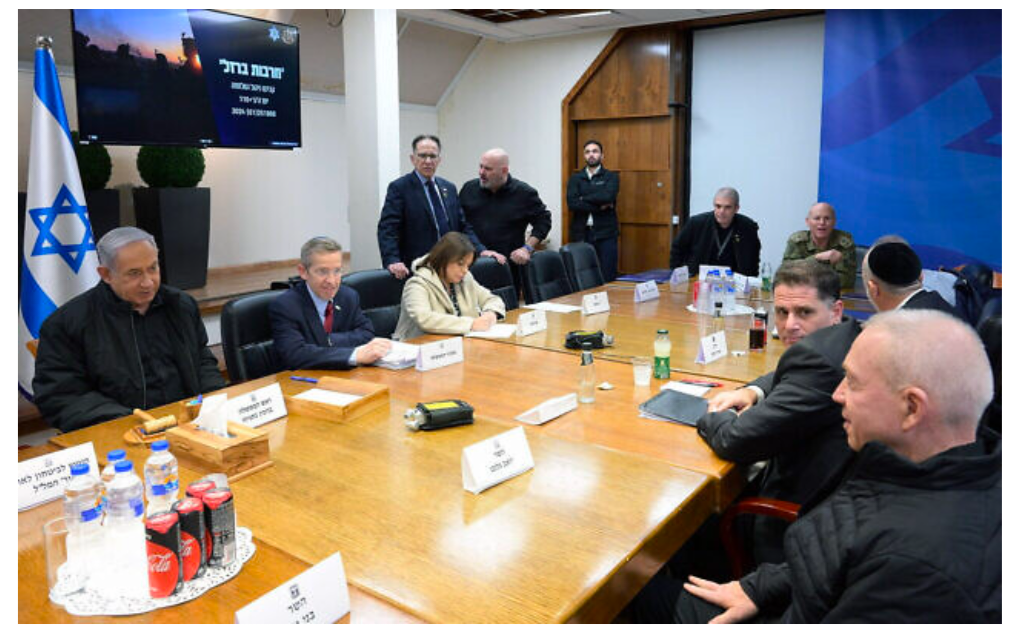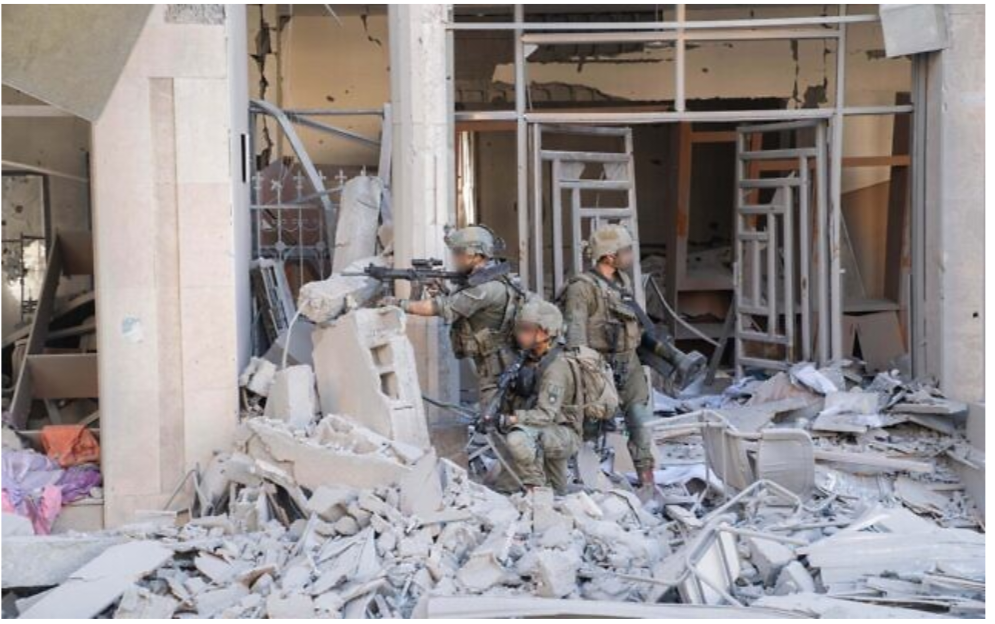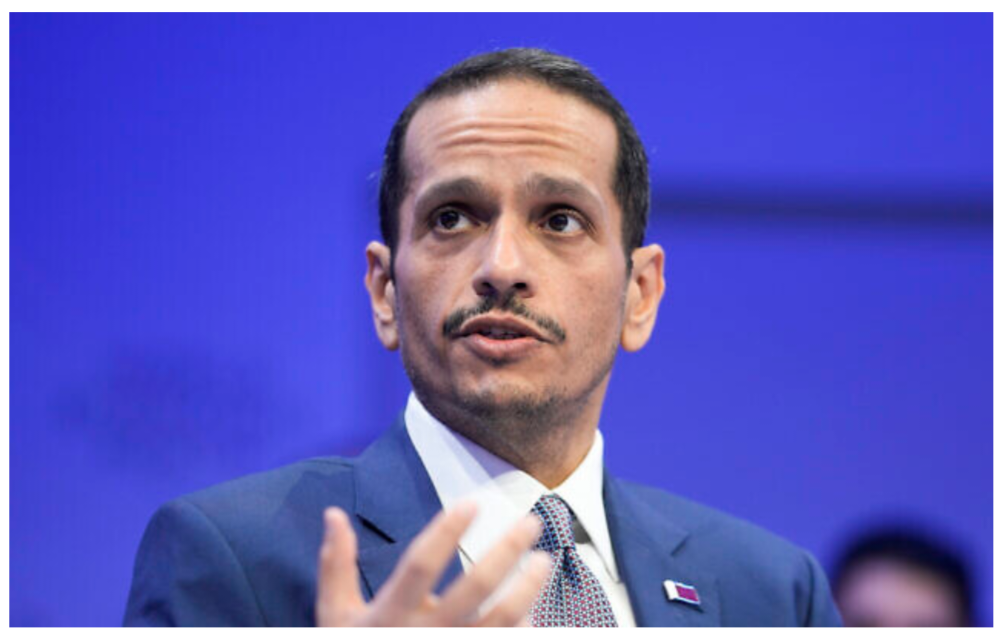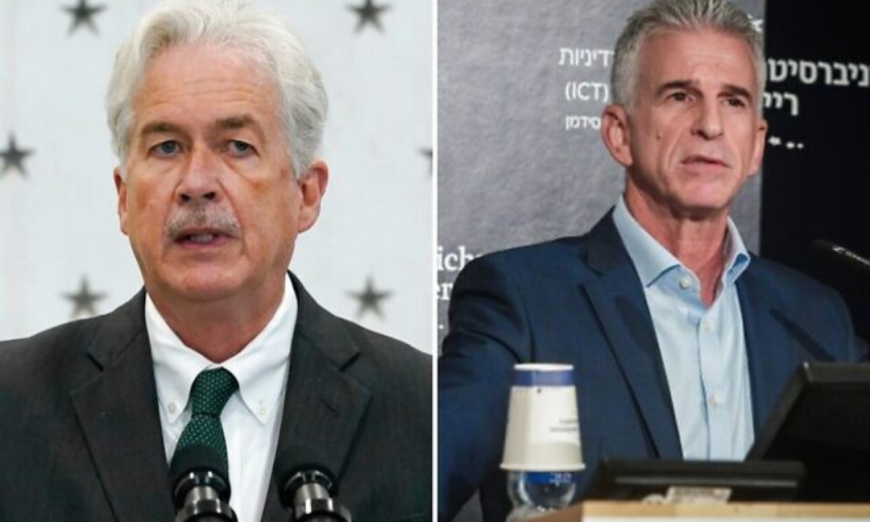A composite image of CIA Director William Burns, left, speaking at the Central Intelligence Agency headquarters in Langley, on July 8, 2022; Mossad Director David Barnea, right, speaking at a conference in Tel Aviv, on September 10, 2023.
The directors of the Mossad and the CIA will meet Qatar’s prime minister in Europe this weekend to discuss a temporary ceasefire in the Gaza Strip and a release of hostages, two officials briefed on the meeting said Thursday.
CIA director William Burns and Mossad chief David Barnea will meet with Qatari Prime Minister and Foreign Minister Sheikh Mohammed bin Abdulrahman Al-Thani to discuss the release of the remaining 132 hostages taken on October 7 during Hamas’s murderous rampage across southern Israel, and a pause in fighting in the war-torn Palestinian enclave that is now in its fourth month.
Egyptian intelligence chief Abbas Kamel will also participate in the meeting, said one source. Israel’s Channel 12 reported that Shin Bet chief Ronen Bar will also be there.
White House national security spokesman John Kirby told reporters traveling with US President Joe Biden aboard Air Force One on Thursday that Burns “has been… involved in helping us with the hostage deal that was in place and trying to help us pursue another one,” referring specific questions to the CIA.
The CIA, which has a policy of not disclosing the director’s travel, declined to comment on the meeting, first reported by The Washington Post. White House Middle East czar Brett McGurk was in Qatar and Egypt this week for talks on the same subject.
Israel’s war cabinet was meeting Thursday night at the Kirya military headquarters in Tel Aviv to discuss the hostage talks. IDF hostage envoy Nitzan Alon and PMO hostage coordinator Gal Hirsch were also in attendance.
Burns and Barnea previously met with Qatari and Egyptian officials to help broker a short-lived, weeklong truce in late November that saw 105 hostages freed. Efforts to secure another agreement to release the remaining hostages, among them children and women, have since faltered.
Hamas has insisted that it will release all the Israeli hostages in Gaza if Israel releases all Palestinian prisoners, which Israel has rejected outright, and has demanded a long-term ceasefire and the complete withdrawal of Israeli forces from Gaza. The Iran-backed terror group has also been seeking guarantees that Israel will not restart the fighting after the truce, in a bid to stay in power.
Israel is said to have recently proposed a two-month ceasefire in exchange for a staged release of the hostages, an offer that Hamas rejected, according to Egyptian officials, but talks appear to have continued and a one-month pause was also floated this week. Under the proposal, Yahya Sinwar and other top Hamas leaders in Gaza would be allowed to relocate to other countries.
Israel has vowed to destroy Hamas’s military and governing capabilities in Gaza and leaders have routinely said fighting will not stop until that goal is achieved.
The government has faced increasing pressure in recent weeks to clinch an immediate deal for the hostages with protesters staging rallies, blocking roads, attempting to blockade aid entry into Gaza, and promising to intensify measures to disrupt public order to secure the return of their loved ones.
Channel 12 on Thursday evening cited a senior Israeli official who described the upcoming meeting in Europe as “critical” to the goal of exerting pressure on Hamas and bridging the gaps preventing a deal for the release of all the hostages.
With all the relevant players in the same room with the exception of Hamas’s leaders, “who are represented by Qatar,” the summit, according to the unnamed Israeli official, “brings together the two [hitherto separate] lines of negotiation by Qatar and Egypt in order to exert joint pressure on Hamas and to bridge the gaps between the two mediators.”
The agreement the leaders are slated to discuss would see all of the hostages released, in phases over several months, with the war paused and thousands of Palestinian security prisoners freed.
A central, massive gap remains between Israel and Hamas, however, given that Israel is refusing to agree to a permanent ceasefire, while Hamas won’t agree to release the remaining hostages in exchange for anything less.
Channel 12 reported that Hamas’s conditions include a 10-14 day pause before it begins releasing hostages; 100 security prisoners released for every “humanitarian” hostage in the first stage of the release; hundreds of security prisoners released for every hostage in subsequent phases; and a withdrawal of all Israeli forces from the Strip as part of the deal.
Israel and Qatar engaged in a tense exchange this week following leaked recordings of a meeting between Prime Minister Benjamin Netanyahu and the families of hostages, in which the premier expressed his dissatisfaction with Qatar as a mediator and disappointment with Washington for not applying more pressure on Doha as hosts of Hamas leaders in the Qatari capital.
“Qatar, from my point of view, is no different in essence than the United Nations… and the Red Cross, [Qatar] is even more problematic,” Channel 12 aired a recording of the premier saying. “I have no illusions about them. They have leverage [over Hamas]… Because [Qatar] funds them.”
Netanyahu said he got “very angry recently with the Americans” for renewing a deal to extend US military presence at a base in Qatar for another 10 years.
Doha responded that it was “appalled” by the reported remarks, calling them “irresponsible and destructive to the efforts to save innocent lives, but are not surprising.”
Finance Minister Bezalel Smotrich, of the far-right Religious Zionism party, lashed out at Qatar on Wednesday and Thursday, saying Doha “encourages terrorism, finances terrorism, pushes terror and is playing a double game.”
A Qatari official told NBC News earlier Thursday that it “would never jeopardize” negotiations about a hostage release due to “differences with individuals.”
It is believed that 132 hostages abducted by Hamas on October 7 remain in Gaza — not all of them alive. The IDF has confirmed the deaths of 28 of those still held by Hamas, citing new intelligence and findings obtained by troops operating in Gaza.
Four hostages were released prior to the November deal, and one was rescued by troops. The bodies of 11 hostages have also been recovered, including three who were mistakenly killed by the military.
Hamas has also been holding the bodies of fallen IDF soldiers Oron Shaul and Hadar Goldin since 2014, as well as two Israeli civilians, Avera Mengistu and Hisham al-Sayed, who are both thought to be alive after entering the Strip of their own accord in 2014 and 2015 respectively.
Agencies contributed to this report.

The war cabinet meets at the IDF’s Kirya military headquarters on January 25, 2024. (Amos Ben-Gershom/GPO)

Soldiers of the Paratroopers Brigade operate in southern Gaza’s Khan Younis, in a handout image released January 25, 2024. (Israel Defense Forces.)

Mohammed Bin Abdulrahman Al Thani, prime minister and minister of foreign affairs of the state of Qatar, attends the Annual Meeting of the World Economic Forum in Davos, Switzerland, Tuesday, Jan. 16, 2024.

